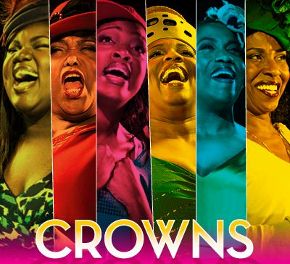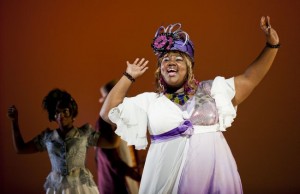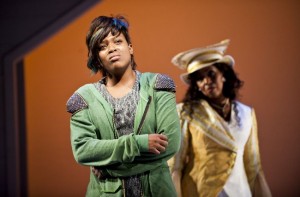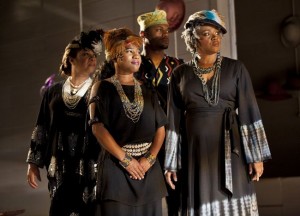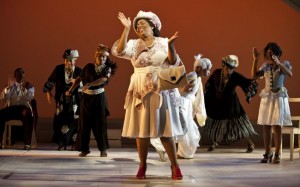IF YOU LET IT, FERVENCY AND JOY
COMPENSATE FOR TROUBLING SCRIPT
A joyful noise is rising out of the Goodman Theatre this summer. With hearty vibrato and a religious fervor rivaled only by televangelists, writer/director Regina Taylor’s revamped hit Crowns is shaking the rafters, and will have you nodding and tapping and humming for the rest of the week. Based on the coffee-table book Crowns: Portraits of Black Women in Hats, the musical is a series of vignettes of black women in hats’”crowns, metaphorically’”and the story behind each of the said hats, these episodes are interconnected by the tale of a young Chicago south-sider, Yolanda, who is sent to visit her hat-wearing, church-going grandmother after her brother becomes a casualty of Chicago violence. The result is an hour and forty minutes of heart-lifting, wholesome gospel music. Sadly, it’s interrupted by tidbits of undercooked dialogue that drives an underwhelming, predictable plot. Still, the music is really something, and the songs are frequently punctuated with an “amen!” by an adoring audience.
In this production, the leading ladies are all worth mentioning for being able to belt it out like they can. As Mama Shaw, Felicia Fields and her deep, rich voice simply steal the show as Yolanda’s grandmother, a woman with a heart of gold and a no-nonsense attitude. Pauletta Washington, E. Faye Butler, and Jasondra Johnson are also excellent in their respective roles’”Johnson has to battle through some more turbulent moments in the script, like the ignominious pun “hattitude” which got, at best, a pity chuckle both of the times it was uttered. She handles this with as much grace as she can.
Alexis J. Rogers offered the most poignant moment of the evening. Although I was unaffected and disconnected by much of the show, the solemn power of Ms. Rogers’ voice in “His Eye is On the Sparrow” managed to bring tears to my eyes.
As Yolanda, Marketta P. Wilder has to work through some tough moments as well’”but she is not quite as effective. The arc of Yolanda’s conversion to her grandmother’s gospel culture is somewhat muddled. At any point in the show, we’re not quite clear on where Yolanda is in her growth. While it’s certainly expected that she will put on her new crown at the end, it seems to come from nowhere’”one moment she’s negative, and the next she comes forth blaring gospel with her whole soul. It isn’t clear whether it’s just Taylor’s flawed script, or if Wilder can’t quite pull her weight, but somewhere along the line this character is lost.
In her director hat, Taylor brings what power she can from her script, in which each character has a song or two where she tells her hat’s story (it kind of reminded me of Cats’ storytelling style, oddly enough). She is able to keep the action on stage interesting, though at times exactly what is happening gets lost. But even in these moments, there is such fervency that, whatever they’re doing, it seems worth watching.
Though Taylor’s reimagining of Crowns is passionate as hell, it attempts a depth that it simply doesn’t have. While it deals with themes that hit home, like disproportionately high violent crime within Chicago’s African American community, it doesn’t offer too much insight’”Yolanda goes south, hears stories about women’s hats, comes to Jesus, and becomes a new woman. Oh, and she trades her baseball cap in favor of a more culturally traditional hat, as well as giving up hip hop in favor of gospel. While it might be an inspiring story to some, it is a shame to see a show so focused on African American cultural heritage wholly disregard hip hop and other more urban black culture. Taylor includes bits of hip hop, but only at moments where Yolanda is being portrayed as immature’”she doesn’t move back to hip hop at the end when she becomes mature. I’m not sure whether this was intentional, but it seems an easy cop out and a downright unfair portrayal of rap culture. And in doing so, Crowns fails to appeal to the younger generations most effected by the issue, who could actually use the message it is trying to send’”instead, it preaches to the choir, who already showed up for the gospel.
But there are more basic production flaws here than Yolanda’s character trajectory. Maruti Evans’ large set is simplistic yet effective, but it is unnecessarily crowded with Maya Ciarocchi’s eyesore projections, which reveal obvious themes of specific scenes and sometimes just subtitle dialogue. These feel cheap, especially when strewn across the much nicer looking wooden panels that frame the space. Furthermore, at times we can’t hear or understand dialogue over the swelling hum of backing vocals’”and considering a majority of the show is sung, we lose quite a bit. Although, given quality of the scene work that we can hear, I’m not convinced we’re missing all that much.
There are some seriously unmanageable problems in Crowns, many of which likely prevented it from ever getting a Broadway run when it was first written ten years ago. It shouldn’t this time either. If you’re watching too closely, these just might bog you down. My suggestion is to expect little in the way of storytelling, but to sit back and let this cast take you to church.
photos by Liz Lauren
Crowns
Goodman Theatre
ends on August 12, 2012
for tickets, call 312.443.3820 or visit Goodman
